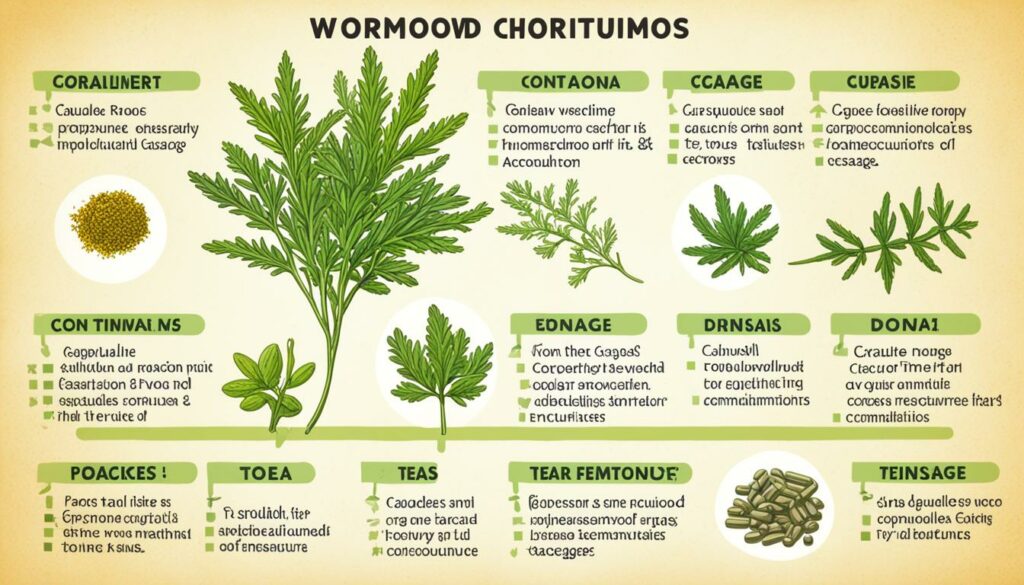Welcome to our article on the uses and benefits of wormwood in herbal medicine. Wormwood, scientifically known as Artemisia absinthium L., is a bitter herb that has been used for centuries to address various health concerns. It has a rich history of traditional use and offers potential effects on digestion, parasites, inflammation, immune disorders, tuberculosis, brain health, and blood sugar balance. However, it is essential to understand that wormwood contains thujone, a toxic substance that can be harmful if consumed excessively.
Wormwood Uses in Digestion and Parasite Treatment
Wormwood has a long-standing reputation for its ability to stimulate digestion and treat various digestive disorders. It is often used to improve appetite and address hypoacidity or lack of appetite.
In addition, wormwood has traditionally been used to expel worms and parasites from the gastrointestinal tract. It is believed to have anti-parasitic properties and can act against several types of pathogens.
The bitter compounds in wormwood can stimulate the production of gastric juices and bile, promoting digestive health. Wormwood may also have potential benefits for treating inflammation associated with conditions like Crohn’s disease and reducing the growth of human breast cancer cells.

Summary
Wormwood is a versatile herb that has been used for centuries to address digestive issues. Its ability to stimulate digestion and combat parasites makes it a valuable natural remedy. Additionally, wormwood’s potential benefits for reducing inflammation and inhibiting cancer cell growth further highlight its role in promoting digestive wellness.
| Benefits of Wormwood in Digestion and Parasite Treatment | How Wormwood Works |
|---|---|
| Stimulates digestion and improves appetite | The bitter compounds in wormwood stimulate the production of gastric juices and bile, promoting healthier digestion and appetite. |
| Expels worms and parasites | Wormwood has long been used to target and eliminate worms and parasites from the gastrointestinal tract, thanks to its anti-parasitic properties. |
| Reduces inflammation associated with digestive disorders | Wormwood may help alleviate inflammation in conditions like Crohn’s disease, enhancing overall gut health. |
| Inhibits the growth of breast cancer cells | Studies have shown that wormwood has the potential to reduce the growth of human breast cancer cells, contributing to the overall wellbeing of the digestive system. |
Wormwood Uses in Inflammation and Immune Disorders
Wormwood, with its powerful compounds like flavonoids and artemisinin, has been the focus of research for its potential benefits in reducing inflammation and modulating the immune system. These properties make wormwood a fascinating herb for addressing inflammation-related conditions and immune disorders.
Various studies have demonstrated the anti-inflammatory effects of wormwood. It has been found to inhibit the production of cytokines, which are proteins that promote inflammation in the body. By reducing cytokine activity, wormwood may help alleviate inflammation in individuals suffering from chronic inflammatory diseases and conditions.
Animal studies have also shown that wormwood can be beneficial in managing specific health concerns. For example, in a study involving knee osteoarthritis, the topical application of wormwood ointment resulted in reduced pain and improved joint function.
Furthermore, wormwood has shown potential in supporting the immune system. Its compounds have been studied for their ability to combat intracellular viruses and bacterial infections. By modulating immune responses, wormwood may offer valuable support in enhancing the body’s defense mechanisms against pathogens.
“Wormwood’s anti-inflammatory properties and immune-modulating effects make it a promising herb for relieving inflammation and supporting immune health.”
| Benefits of Wormwood for Inflammation and Immune Disorders | Examples |
|---|---|
| Reduces inflammation | Alleviating symptoms of chronic inflammatory conditions |
| Modulates the immune system | Enhancing the body’s defense against intracellular viruses and bacterial infections |
| Improves joint function | Providing relief for individuals with knee osteoarthritis |
However, it is important to note that further research is still needed to fully understand the effects of wormwood on inflammation and immune disorders. Human clinical trials are necessary to validate these findings and assess the herb’s safety and long-term efficacy in such conditions.
Next, we’ll explore another fascinating aspect of wormwood: its potential in the treatment of tuberculosis.

Wormwood Uses in Tuberculosis Treatment
Wormwood has been investigated for its effects on tuberculosis (TB), a bacterial infection that primarily affects the lungs. Research has shown that wormwood extracts may be effective against mycobacterial infections that cause TB, and they do not appear to be toxic to animals. These findings suggest that wormwood could potentially be used as a natural treatment or supportive therapy for TB. However, more research is needed to determine the effectiveness of wormwood in humans with TB.
Wormwood Uses in Brain Health and Mood Regulation
Wormwood has garnered interest for its potential impact on brain health and mood regulation. Research suggests that this herb may support the formation of glutathione, an antioxidant known for its protective effects on the brain. Glutathione plays a crucial role in combating oxidative stress, which can contribute to neurological disorders.
Animal studies have also hinted at the possible antidepressant properties of wormwood. It is believed that wormwood may help increase serotonin levels, a neurotransmitter that plays a key role in mood regulation. By modulating serotonin, wormwood may offer potential benefits for individuals dealing with mood disorders or fluctuations.
Furthermore, studies have explored the potential benefits of wormwood in neurological conditions such as Alzheimer’s and Parkinson’s disease. Preliminary findings suggest that wormwood may help reduce confusion and disorientation in individuals with these conditions. However, to fully understand the effects of wormwood on brain health and mood, more human research is necessary.

“The brain is a complex organ, and maintaining its health is crucial for overall well-being. Wormwood shows promise as a natural supplement that may support brain health and mood regulation. However, it’s essential to consult with a healthcare professional before incorporating wormwood into your routine, especially if you have any underlying health conditions.”
\n
Wormwood Uses in Blood Sugar Balance
Wormwood, with its potential benefits for diabetes management, has shown promising results in balancing blood sugar levels and improving insulin function. Research suggests that the use of wormwood may help prevent the accumulation of lipids in the blood and reduce blood sugar levels in individuals with type 2 diabetes and hyperlipidemia.
These beneficial effects of wormwood on blood sugar balance may be attributed to the presence of thujone and other bioactive compounds found in the herb. Thujone has been shown to have hypoglycemic properties, assisting in the regulation of blood sugar levels.
Further studies are still necessary to understand and determine the exact mechanisms by which wormwood affects blood sugar balance. However, the potential benefits of wormwood for diabetes management make it an intriguing area of research.

“Wormwood has demonstrated favorable effects on blood sugar levels and insulin function in individuals with type 2 diabetes and hyperlipidemia.”
Regular monitoring of blood sugar levels and working closely with a healthcare professional is essential for individuals with diabetes. Wormwood should not be used as a substitute for prescribed medications or medical advice. It is always advisable to consult with a healthcare professional before incorporating wormwood or any other natural remedies into your diabetes management plan.
The Benefits of Wormwood for Diabetes:
- Potential to balance blood sugar levels
- Improvement in insulin function
- Assistance in the prevention of lipid accumulation in the blood
Wormwood in Absinthe and Culinary Uses
Wormwood, famous for its use in the alcoholic beverage absinthe, plays a vital role as the active component. Though the production and consumption of absinthe have faced regulations due to its thujone content, it is now available in the United States with certain restrictions. Apart from its association with absinthe, wormwood is also utilized in culinary applications. Its bitter taste and aromatic properties make it a well-liked ingredient in herbal liqueurs, cocktails, and even some traditional dishes.
However, caution should be exercised when incorporating wormwood in culinary preparations, as it has the potential to be toxic when consumed in excess.

| Wormwood Uses in Absinthe | Culinary Uses of Wormwood |
|---|---|
|
|
Wormwood Safety and Precautions
While exploring the potential uses and benefits of wormwood, it is crucial to prioritize safety and be aware of the potential risks associated with its consumption. Wormwood contains a compound called thujone, which is known to possess toxic properties that can lead to adverse effects, particularly when consumed in excessive amounts.
Individuals who fall into the following categories should avoid taking wormwood:
- Pregnant women
- Breastfeeding women
- Individuals with epilepsy
- Those with heart disease
- People with kidney problems
- Those with allergies to wormwood or related plants
Long-term use of wormwood may result in several side effects, including:
- Digestive upset
- Kidney failure
- Nausea
- Vomiting
- Seizures
Consulting with a healthcare professional before incorporating wormwood into your regimen is highly recommended, particularly if you have any pre-existing medical conditions or are currently taking medications. They can provide personalized advice based on your specific situation and help you determine the appropriateness of using wormwood.
Remember, it is always better to err on the side of caution when it comes to your health and well-being.

Expert Insight:
“Although wormwood has potential benefits, it is essential to exercise caution due to its thujone content. The toxicity of thujone can result in seizures and other harmful effects. If you are unsure about using wormwood, consult a healthcare professional to ensure it is safe for you.”
– Dr. Sarah Johnson, Naturopathic Physician
Key Takeaways:
- Wormwood contains thujone, a toxic compound that can have adverse effects when consumed in excess.
- Pregnant and breastfeeding women, individuals with epilepsy, heart disease, kidney problems, and certain allergies should avoid wormwood.
- Prolonged use of wormwood may lead to side effects such as digestive upset, kidney failure, nausea, vomiting, and seizures.
- Consult with a healthcare professional before using wormwood, especially if you have any pre-existing medical conditions or are taking medication.
| At-Risk Individuals | Potential Side Effects |
|---|---|
| Pregnant women | Increased risk of harm to fetus |
| Breastfeeding women | Potential transfer of thujone to the infant |
| Individuals with epilepsy | Possible seizures or worsening of symptoms |
| People with heart disease | Exacerbation of cardiovascular conditions |
| Those with kidney problems | Potential kidney damage |
| Allergies to wormwood or related plants | Allergic reactions |
Wormwood Dosage and Forms
When it comes to wormwood, there is no established dosage as every individual’s needs may vary. It is crucial to understand that the Food and Drug Administration (FDA) strictly prohibits the use of thujone, the active ingredient in wormwood, in foods and beverages. It is recommended to consult with a healthcare professional before using wormwood, especially if you have any underlying health conditions or are taking medications.
Wormwood is available in various forms, allowing you to choose the option that suits you best. These forms include:
-
- Liquid tinctures: Wormwood extracts in alcohol or glycerin form, typically taken orally.
- Tablets: Convenient and easily consumable tablets or capsules with standardized wormwood dosage.
- Dried herb: Crushed or powdered wormwood that can be used for teas or other preparations.
- Teas: Infusions made by steeping dried wormwood in hot water, allowing you to enjoy its benefits.
- Absinthe: An alcoholic drink that traditionally includes wormwood as an ingredient, often prepared with other botanicals.

It is important to note that the FDA restricts the thujone content in wormwood products to 10 parts per million or less, ensuring your safety and well-being. By following these regulations, manufacturers ensure that wormwood products are compliant with health standards.
Remember, taking the right dosage and using the appropriate form of wormwood is crucial for your safety and effectiveness. If you have any concerns or questions about wormwood, it is always best to consult with a healthcare professional who can guide you based on your specific needs.
Wormwood in Traditional and Modern Medicine
Throughout history, wormwood has played a prominent role in traditional medicine, offering remedies for various ailments. Its versatile properties have made it a popular choice for digestive issues, parasitic infections, and inflammation. Furthermore, wormwood has increasingly gained recognition in modern medicine for its potential therapeutic benefits in treating conditions such as Crohn’s disease, tuberculosis, and inflammatory disorders. Research has also explored its impact on brain health and blood sugar control. However, it is important to note that further studies are necessary to fully understand the efficacy and safety of wormwood in these applications.
The Use of Wormwood in Traditional Medicine
In traditional medicine, wormwood has been relied upon for generations due to its ability to stimulate digestion, making it a valuable aid for gastrointestinal conditions. It has also been recognized as an effective anti-parasitic agent, offering relief from common parasitic infections. Additionally, wormwood possesses potent anti-inflammatory properties, enriching its role in addressing a range of inflammatory disorders. The historical use of wormwood in traditional medicine highlights its longstanding reputation as a versatile and reliable natural remedy.
Wormwood’s Prominence in Modern Medicine
In recent years, wormwood has emerged as a potential natural treatment for various medical conditions in modern medicine. Research has investigated its effectiveness in managing Crohn’s disease, an inflammatory bowel disease that affects the digestive tract. Additionally, wormwood’s efficacy against tuberculosis, a bacterial infection primarily affecting the lungs, has shown promise in preclinical studies. Moreover, wormwood’s impact on brain health, particularly in protecting against neurodegenerative diseases, has sparked interest in its potential therapeutic applications. Furthermore, studies suggest that wormwood may aid in blood sugar balance, holding potential benefits for individuals with diabetes or hyperlipidemia.
Filling the Gaps: The Need for Further Research
While the use of wormwood in both traditional and modern medicine exhibits promising results, it is essential to emphasize the critical need for further research. Comprehensive studies are necessary to evaluate the efficacy, safety, and optimal dosage of wormwood in various medical applications. Additionally, clinical trials involving human subjects will provide valuable insights into its potential therapeutic benefits and possible interactions with existing medications. A robust foundation of scientific evidence is required to validate and effectively integrate wormwood as a legitimate treatment option.
Wormwood’s historical significance in traditional medicine and its growing recognition in modern medicine indicate its potential as a valuable natural remedy. However, further research is needed to unravel its full therapeutic potential and ensure its safe application in medical practice.
To summarize, wormwood’s rich history in traditional medicine and its potential applications in modern medicine reflect its versatility and diverse therapeutic properties. While its traditional use for digestion, parasites, and inflammation is well-established, wormwood’s potential in treating conditions like Crohn’s disease, tuberculosis, and inflammatory disorders offers hope for alternative treatment options. Furthermore, its impact on brain health and blood sugar balance opens up possibilities for addressing neurodegenerative diseases and diabetes. Nonetheless, continued research is crucial to unlock its full potential and ensure safe and effective utilization in medical practices.
| Traditional Medicine | Modern Medicine |
|---|---|
| Stimulates digestion | Treats Crohn’s disease |
| Anti-parasitic agent | Effective against tuberculosis |
| Anti-inflammatory properties | Protects brain health |

Conclusion
Wormwood, a bitter herb known for its distinctive taste and aroma, has a rich history as a medicinal plant. Its potential uses and benefits span a wide range of conditions, such as supporting digestion, expelling parasites, reducing inflammation, aiding immune health, treating tuberculosis, protecting brain health, and balancing blood sugar levels. However, it is important to exercise caution when using wormwood due to its thujone content, which can be toxic in excessive amounts.
If you are considering incorporating wormwood into your health regimen, it is advisable to consult with a healthcare professional, particularly if you have any pre-existing health conditions or are taking medications. They can provide personalized guidance and ensure that wormwood is a suitable option for you. Remember, safety should always be a top priority.
While wormwood holds significant potential, further research is needed to fully understand its efficacy and safety in various applications. As a consumer, it is essential to stay informed and rely on credible sources of information when making decisions about your health. By doing so, you can make educated choices that align with your individual needs and goals.
FAQ
What are the uses of wormwood in digestion and parasite treatment?
Wormwood has been traditionally used to stimulate digestion, improve appetite, and expel worms and parasites from the gastrointestinal tract. It has potential benefits for addressing hypoacidity, lack of appetite, and gastrointestinal infections.
How can wormwood be used for inflammation and immune disorders?
Wormwood has shown potential in reducing inflammation and modulating the immune system. Its compounds have been studied for their effects on conditions like Crohn’s disease and immune disorders. However, further research is needed to understand its full efficacy.
Can wormwood be used for tuberculosis treatment?
Wormwood extracts have demonstrated effectiveness against mycobacterial infections that cause tuberculosis. However, more research is needed to determine its exact role in tuberculosis treatment.
What are the uses of wormwood in brain health and mood regulation?
Wormwood has potential benefits for brain health and mood regulation. It may support antioxidant protection, increase serotonin levels, and alleviate symptoms of neurological diseases like Alzheimer’s and Parkinson’s. Yet, more human research is required for conclusive evidence.
How does wormwood help balance blood sugar levels?
Wormwood may help balance blood sugar levels and improve insulin function. Research suggests that it could prevent lipid accumulation in the blood, leading to lower blood sugar levels. However, further studies are needed to understand its mechanisms and role in diabetes management.
What are the wormwood’s uses in absinthe and culinary applications?
Wormwood is known for its use in absinthe, a highly regulated alcoholic drink. It has a bitter taste and aromatic properties that make it a popular ingredient in herbal liqueurs, cocktails, and some traditional dishes. However, caution and moderation are necessary due to its potential toxicity.
Are there any safety precautions to consider when using wormwood?
Yes, wormwood contains thujone, a toxic substance that can cause seizures and other adverse effects in excessive amounts. Pregnant and breastfeeding women, individuals with epilepsy, heart disease, kidney problems, and certain allergies should avoid wormwood. Long-term use may lead to side effects, such as digestive upset and kidney failure. It’s important to consult with a healthcare professional before using wormwood, especially if you have any pre-existing medical conditions or are taking medication.
What forms of wormwood are available, and how should it be taken?
Wormwood can be taken in various forms, including liquid tinctures, tablets, dried herb, and teas. It is also an ingredient in absinthe. However, it’s important to note that thujone content in wormwood products should be 10 parts per million or less, as regulated by the FDA. It’s recommended to speak with a healthcare professional for guidance on dosage and form, especially if you have underlying health conditions or are taking medications.
What is the role of wormwood in traditional and modern medicine?
Wormwood has a long history of use in traditional medicine for its various medicinal properties. It has been used for digestion, parasite treatment, inflammation, immune disorders, tuberculosis, brain health, and blood sugar balance. In modern medicine, wormwood has shown potential in treating conditions like Crohn’s disease, tuberculosis, and inflammatory diseases. However, more research is needed for a comprehensive understanding of its efficacy and safety.
What are the overall uses and benefits of wormwood?
Wormwood has potential uses in digestion, parasite treatment, inflammation, immune disorders, tuberculosis, brain health, and blood sugar balance. However, it is important to exercise caution due to its thujone content. Further research is needed to fully understand its efficacy and safety.

